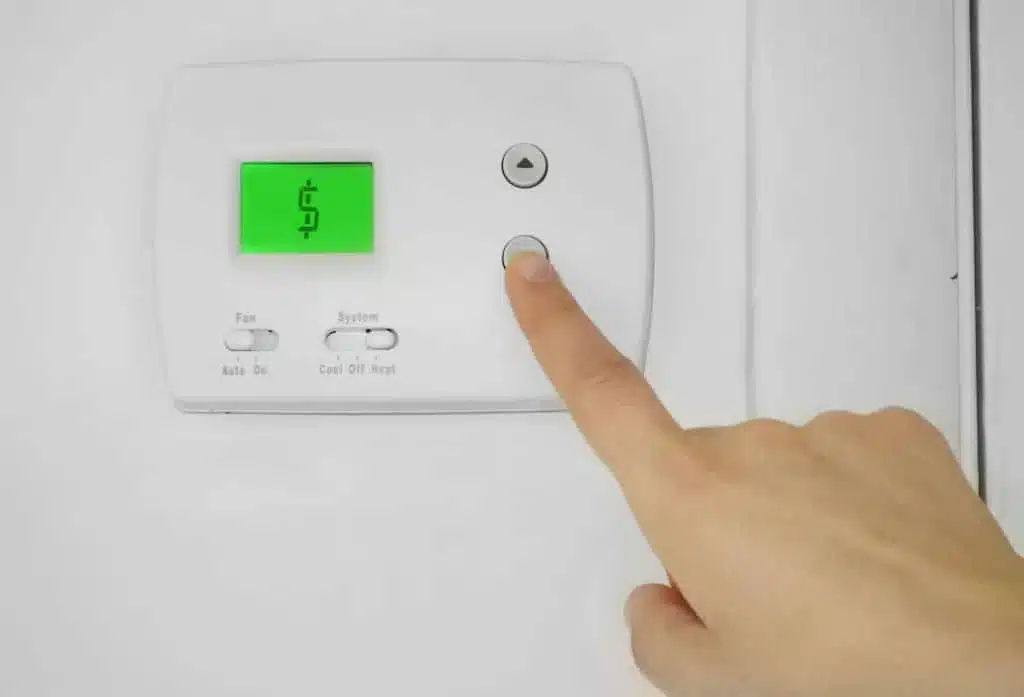Air Conditioning can be quite energy-efficient with the right models, upkeep and settings.
8 Ways to Maximize an Energy-Efficient Air Conditioner
- During the summer months, program your settings to match the ideal thermostat temperature of 78 degrees, to better manage cooling costs.
- At night, when the air is cooler, turn the A/C off and open your windows.
- Turn off all unnecessary lights and appliances. They all generate heat that the air conditioner has to then remove.
- Program your thermostat to increase the temperature by a few degrees when no one is home. Doing so will decrease the workload on your A/C.
- Install and use ceiling fans. They circulate the air more efficiently than an air conditioner can by itself, and they use far less energy. Just make sure that you’ve set the correct ceiling fan direction with air conditioning —counterclockwise, which sends the air down.
- Fully and properly insulate and seal any point where an A/C unit (or any part of a larger A/C system) enters your house. A poorly sealed window unit, for example, can let in more hot air than your unit can cope with.
- If you have window A/C units, make sure they are clean. Monthly air conditioner cleanings — wiping down the vents and rinsing the filter — will keep your units running smoothly and efficiently.
- If you have central air conditioning, make sure your air ducts are clean. There are many benefits of air duct cleaning, including catching mold before it gets hold on your system; keeping dust out of the air and off your clothes, furniture, and surfaces; and improving the efficiency of your air-conditioning system.
Keep your home cool with these air conditioner maintenance tips that will help prolong the life of your A/C unit and make it more energy-efficient.

What is Energy Efficient Ratio (EER)?
This particular metric evaluates the actual efficiency of an A/C window unit. In order to find the most energy-efficient units, you would view the unit’s EER number or energy efficiency ratio. “The EER is the ratio of the cooling capacity (in British thermal units [Btu] per hour) to the power input (in watts),” says the Department of Energy. The higher the EER, the more efficient the air conditioner. As an example, if you have an air conditioner that is rated to 6,000 BYUs, and it takes 600 watts to run, the calculation would be 6,000 divided by 600, which equals 10. This unit’s EER would be 10. In general, the most efficient window air conditioning units have an EER of 12 or above. The EER is also dependent on the size and cooling power of the unit. For the most part, it is much easier for a smaller 5,000 BTU or 6,000 BTU unit to have that type of efficiency than it is for a 12,000 BTU unit that is larger, bulkier and requires more heavy-duty parts to cool larger rooms and spaces.
Costs of Air Conditioning and Ceiling Fans: What’s the Difference?
When the summer sun beats down on us we instinctively turn on our air conditioners to keep cool. We think this is the only way to keep cool. Maybe not. Ceiling fans can also do the job of keeping our homes and offices cool. And the difference in both the energy and economical cost of ceiling fans compared to air conditioners is significant.
According to one study published in The New York Times, on average:
- A central A/C unit runs about 3 kilowatts and costs about 36 cents per hour
- A window A/C unit runs on 1.2 kilowatts and costs about 14 cents per hour
- A ceiling fan runs on only 30 watts and costs about 1 cent per hour
To put this in perspective, we spend billions of dollars every year on the electricity costs of air conditioning, accounting for up to 15% of the energy used in many homes and even representing up to 70% of the summer electric bill in warm climates. The energy costs associated with ceiling fans, in contrast, is much different. Whereas a 2.5-ton central air conditioner uses about 3,500 watts and a window A/C unit typically uses between 500 to 1,500 watts, a ceiling fan uses just 15 to 95 watts depending on its size and speed.
Are Heat Pumps and Air Conditioners Similar?
When shopping for an HVAC system to cool your home or office, either a heat pump or air conditioner will do the job. Both systems use compressed refrigerants to collect heat from inside the house as air passes over the coil in the air handler and transfers it outside. In essence, heat pumps and air conditioners move heat from inside the home to an outdoor location. Contrary to popular opinion, air conditioners do not produce cold air. Instead, they cool your house by removing heat energy from the home, pumping it away to a location outside the home. Air conditioners and heat pumps work in similar ways. Air conditioners pump heat out of a home, just like a heat pump when operating in cooling mode. In short, air conditioners and heat pumps are essentially the same when operating in cooling mode, with no real difference in operation, efficiency, or energy costs.
Why Purchase An Air Conditioner?
Air conditioners are more sophisticated and energy-efficient than ever. They are available in a range of styles and sizes to accommodate any living situation, making it simple to find the best air conditioner for your home. And they are, quite literally, a breath of fresh air on a hot, muggy day. With hot weather just around the corner, now is the time to get your A/C unit in good working order and at optimal energy efficiency! Contact your premier source for heating and air conditioning in Washington, Oregon and Idaho, Apollo Heating and Air Conditioning, at (509) 396-COLD (2653)!



